2014年大学日语四级真题
2014年日语四级2007-2003
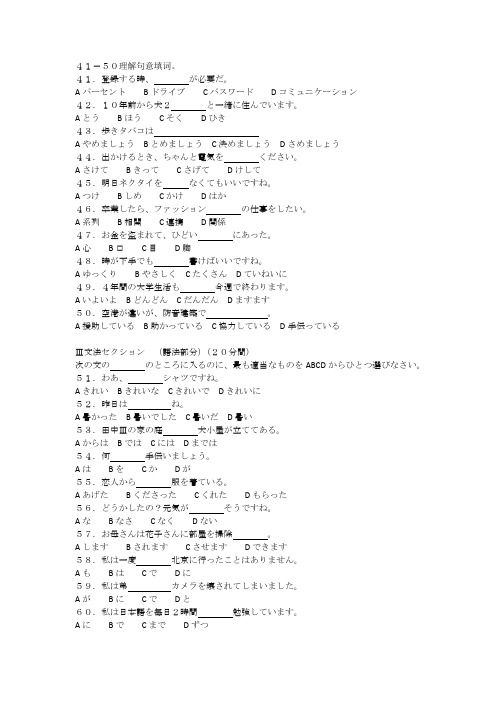
41-50理解句意填词。
41.登録する時、が必要だ。
AパーセントBドライブCパスワードDコミュニケーション42.10年前から犬2と一緒に住んでいます。
AとうBほうCそくDひき43.歩きタバコはAやめましょうBとめましょうC決めましょうDさめましょう44.出かけるとき、ちゃんと電気をください。
AさけてBきってCさげてDけして45.明日ネクタイをなくてもいいですね。
AつけBしめCかけDはか46.卒業したら、ファッションの仕事をしたい。
A系列B相関C連携D関係47.お金を盗まれて、ひどいにあった。
A心B口C目D胸48.時が下手でも書けばいいですね。
AゆっくりBやさしくCたくさんDていねいに49.4年間の大学生活も今週で終わります。
AいよいよBどんどんCだんだんDますます50.空港が違いが、防音建築で。
A援助しているB助かっているC協力しているD手伝っているⅢ文法セクション(語法部分)(20分間)次の文ののところに入るのに、最も適当なものをABCDからひとつ選びなさい。
51.わあ、シャツですね。
AきれいBきれいなCきれいでDきれいに52.昨日はね。
A暑かったB暑いでしたC暑いだD暑い53.田中Ⅲの家の庭犬小屋が立ててある。
AからはBではCにはDまでは54.何手伝いましょう。
AはBをCかDが55.恋人から服を着ている。
AあげたBくださったCくれたDもらった56.どうかしたの?元気がそうですね。
AなBなさCなくDない57.お母さんは花子さんに部屋を掃除。
AしますBされますCさせますDできます58.私は一度北京に行ったことはありません。
AもBはCでDに59.私は弟カメラを壊されてしまいました。
AがBにCでDと60.私は日本語を毎日2時間勉強しています。
AにBでCまでDずつ61.私が帰る家にいてください。
AまでにBうちにCあいだにDときに62.パソコンが初めての物にもわかる説明してください。
AのにBためにCようにDそうに63.鈴木さん、その記事を読み、私にも見せてください。
2014真题
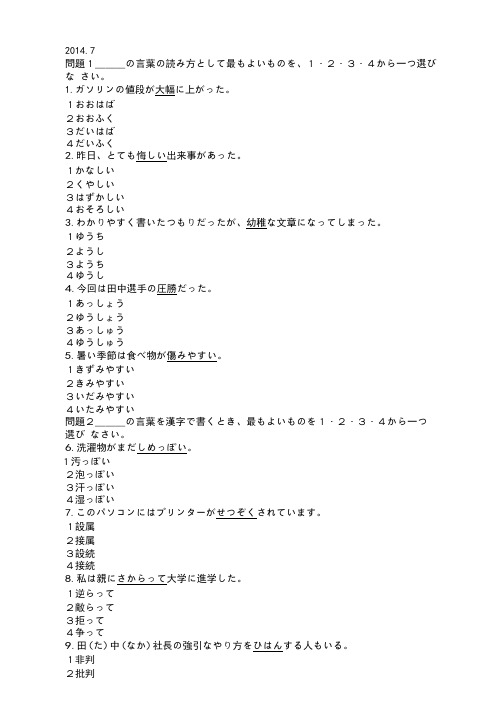
問題1___の言葉の読み方として最もよいものを、1・2・3・4から一つ選びなさい。
1.ガソリンの値段が大幅に上がった。
1おおはば2おおふく3だいはば4だいふく2.昨日、とても悔しい出来事があった。
1かなしい2くやしい3はずかしい4おそろしい3.わかりやすく書いたつもりだったが、幼稚な文章になってしまった。
1ゆうち2ようし3ようち4ゆうし4.今回は田中選手の圧勝だった。
1あっしょう2ゆうしょう3あっしゅう4ゆうしゅう5.暑い季節は食べ物が傷みやすい。
1きずみやすい2きみやすい3いだみやすい4いたみやすい問題2___の言葉を漢字で書くとき、最もよいものを1・2・3・4から一つ選びなさい。
6.洗濯物がまだしめっぽい。
1汚っぽい2泡っぽい3汗っぽい4湿っぽい7.このパソコンにはプリンターがせつぞくされています。
1設属2接属3設続4接続8.私は親にさからって大学に進学した。
1逆らって2敵らって3拒って4争って9.田(た)中(なか)社長の強引なやり方をひはんする人もいる。
1非判2批判4非反10.A社の製品のほうが機能の面ではおとっていると思う。
1悪って2負って3劣って4乏って問題3()に入れるのに最もよいものを、1・2・3・4から一つ選びなさい。
11.歴史小説家西(にし)村(むら)氏の代表的な作品を収めた作品()が発行された。
1集2族3部4団12.ここから駅まで行くなら、線路()の道を行くのが一番早いですよ。
1付き2並び3沿い4従い13.田中先生は、子どもの英語教育に関する()問題について研究している。
1総2複3数4諸14.大きな図書館に行きたいが、遠いのでけっこう電車()がかかる。
1金2賃3料4財15.町は朝からお祭りムード()だった。
1一例2一面3一種4一色問題4()に入れるのに最もよいものを、1・2・3・4から一つ選びなさい。
16.子どものいたずらにいちいち()を立てても仕方がない。
1気2頭3腹4心17.A社が開発した商品管理システムは評価が高く、多くの会社に()されている。
2014年版高考日语试题及答案
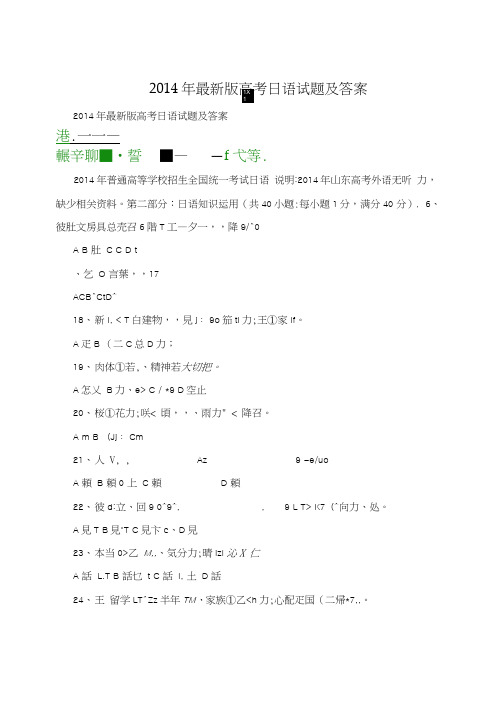
2014年最新版高考日语试题及答案港.一一—輾辛聊■•誓 ■— —f 弋等.2014年普通高等学校招生全国统一考试日语 说明:2014年山东高考外语无听 力,缺少相关资料。
第二部分:日语知识运用(共40小题:每小题1分,满分40 分),6、彼肚文房具总売召6階T 工—夕一,,降9/^0A B 肚 C C D t、乞 O 言葉,,17ACB^CtD^18、 新I, < T 白建物,,見j : 9o 笳tl 力;王①家If 。
A 疋B (二C 总D 力;19、 肉体①若,、精神若大切把。
A 怎乂B 力、e>C / *9D 空止20、 桜①花力;咲< 頃,,、雨力" < 降召。
A mB (Jj : Cm21、 人 V, ,Az 9 -e/uoA 頼B 頼0 上C 頼D 頼 22、 彼d:立、回9 0^9^,, 9 L T> K7(^向力、处。
A 見T B 見"T C 見卞c 、D 見23、 本当0>乙 M,,、気分力;晴izl 沁X 仁A 話 L.TB 話乜 tC 話 I, 土D 話24、 王 留学LT^Zz 半年TM 、家族①乙<h 力;心配疋国(二帰*7,,。
2014AZ B J: 9 C 6 L D 25、抄母*1/子供(二肩总揉人 06 o T> 気持2, , r L /ioA tHi J: 9B J: f 9C Dde>l^、26、中村 1 AUX 朝力、5 頭力、痛c、<t言oTl^to風邪①,,rtoA J: ?B f 9CD 6 L27、本棚①横(I 望遠鏡力;掛l^T,,。
AC、土B坯。
直沁D “性28、歌手道肚厳t,m■力;、乙紅力、沁歌T食m , ot 9r toA<EBC、< C < D L 929、CMfJ:簡単力、、去孑自分T,,乙上世。
AC、召 B § 5 召 D ^6 630、茶总飲族吉芝&,,力、、(<寝沁“沁。
1995年日语能力考试四级真题+答案
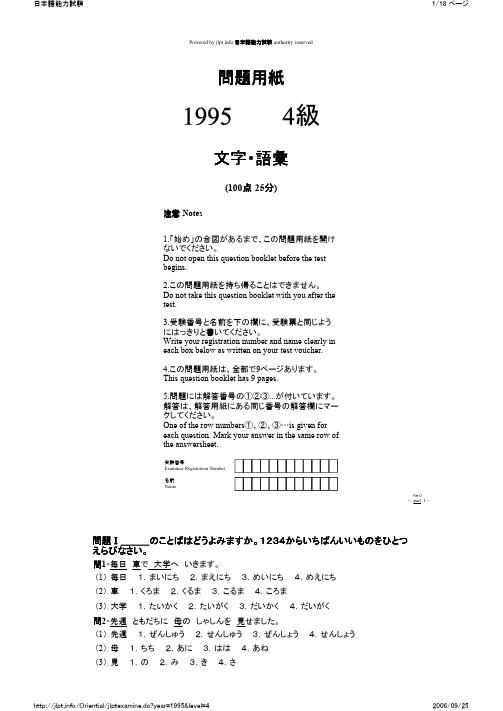
1.きょうの じゅぎょうは 9じ10ぷんに はじまりました。 2.きょうの じゅぎょうは 9じ20ぷんに はじまりました。 3.きょうの じゅぎょうは 9じ30ぷんに はじまりました。 4.きょうの じゅぎょうは 9じ40ぷんに はじまりました。
受験番号 Examinee Registration Number 名前 Name
ページ
-- part 1 --
問題Ⅰ___のことばはどうよみますか。1234からいちばんいいものをひとつ えらびなさい。
問1・毎日 車で 大学へ いきます。 (1).毎日 1.まいにち 2.まえにち 3.めいにち 4.めえにち (2).車 1.くろま 2.くるま 3.こるま 4.ころま (3).大学 1.たいかく 2.たいがく 3.だいかく 4.だいがく
2006/09/25
日本語能力試験
6/18 ページ
1. 2. 3. 4. 問(4).
1. 2. 3. 4.
問(5).
/Oriential/jlptexamine.do?year=1995&験
7/18 ページ
1. 2. 3. 4. 問(6).
6.テープを聞きながら、この問題用紙にメモをとってもかまいません。 Youmaymakenotesinthisquestionbooklet.
受験番号 Examinee Registration Number
名前 Name
ページ
-- part 2 --
問題Ⅰ
例(0).
/Oriential/jlptexamine.do?year=1995&level=4
2014年日语普通高等学校招生全国统一考试
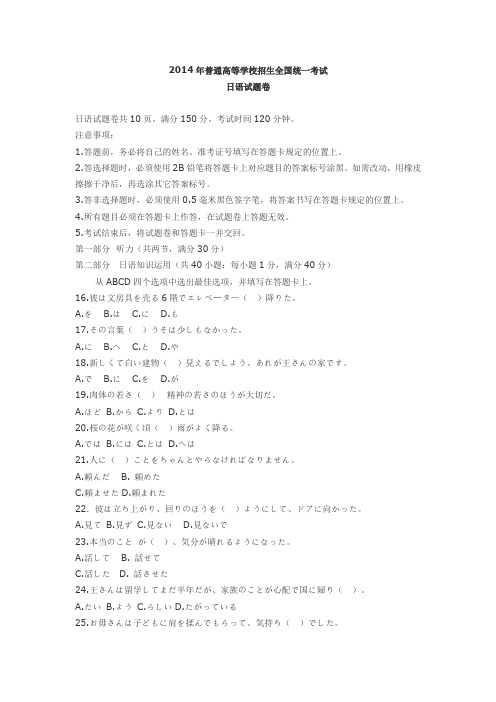
2014年普通高等学校招生全国统一考试日语试题卷日语试题卷共10页。
满分150分。
考试时间120分钟。
注意事项:1.答题前,务必将自己的姓名、准考证号填写在答题卡规定的位置上。
2.答选择題时,必须使用2B铅笔将答题卡上对应题目的答案标号涂黑。
如需改动,用橡皮擦擦干净后,再选涂其它答案标号。
3.答非选择題时,必须使用0.5毫米黑色签字笔,将答案书写在答题卡规定的位置上。
4.所有題目必须在答题卡上作答,在试题卷上答题无效。
5.考试结束后,将试题卷和答题卡一并交回。
第一部分听力(共两节,满分30分)第二部分日语知识运用(共40小题:每小题1分,满分40分)从ABCD四个选项中选出最佳选项,并填写在答题卡上。
16.彼は文房具を売る6階でエレベータ-()降りた。
A.をB.はC.にD.も17.その言葉()うそは少しもなかった。
A.にB.へC.とD.や18.新しくて白い建物()見えるでしよう。
あれが王さんの家です。
A.でB.にC.をD.が19.肉体の若さ()精神の若さのほうが大切だ。
A.ほどB.からC.よりD.とは20.桜の花が咲く頃()雨がよく降る。
A.ではB.にはC.とはD.へは21.人に()ことをちゃんとやらなければなりません。
A.頼んだB. 頼めたC.頼ませたD.頼まれた22.彼は立ち上がり、回りのほうを()ようにして、ドゕに向かった。
A.見てB.見ずC.見ないD.見ないで23.本当のことが()、気分が晴れるようになった。
A.話してB. 話せてC.話したD. 話させた24.王さんは留学してまだ半年だが、家族のことが心配で国に婦り()。
A.たいB.ようC.らしいD.たがっている25.お毋さんは子どもに肩を揉んでもらって、気持ち()でした。
A.いいようB.よさそうC.いいみたいD.よいらしい26.中村さんは朝からが痛いと言っています。
風邪の()です。
A.ようB.そう C.みたい D.らしい27.本棚の横に、望遠鏡が掛けて()。
2014年大学英语四级考试题型
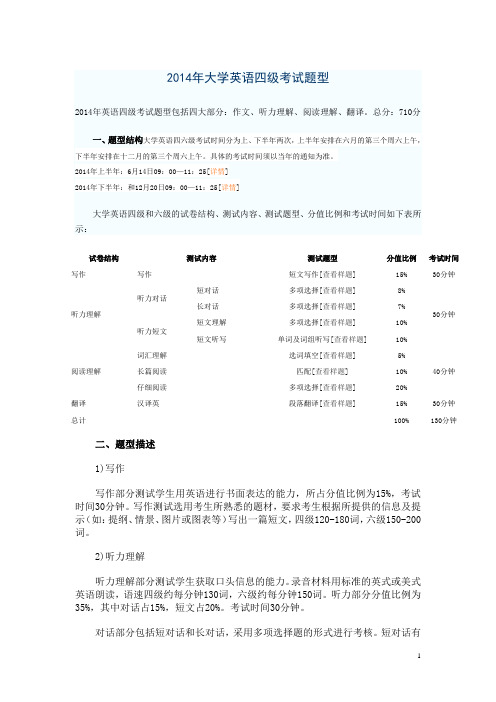
2014年大学英语四级考试题型2014年英语四级考试题型包括四大部分:作文、听力理解、阅读理解、翻译。
总分:710分一、题型结构大学英语四六级考试时间分为上、下半年两次,上半年安排在六月的第三个周六上午,下半年安排在十二月的第三个周六上午。
具体的考试时间须以当年的通知为准。
2014年上半年:6月14日09:00—11:25[详情]2014年下半年:和12月20日09:00—11:25[详情]大学英语四级和六级的试卷结构、测试内容、测试题型、分值比例和考试时间如下表所示:试卷结构测试内容测试题型分值比例考试时间写作写作短文写作[查看样题] 15% 30分钟听力理解听力对话短对话多项选择[查看样题] 8%30分钟长对话多项选择[查看样题] 7%听力短文短文理解多项选择[查看样题] 10%短文听写单词及词组听写[查看样题] 10%阅读理解词汇理解选词填空[查看样题] 5%40分钟长篇阅读匹配[查看样题] 10%仔细阅读多项选择[查看样题] 20%翻译汉译英段落翻译[查看样题] 15% 30分钟总计100% 130分钟二、题型描述1)写作写作部分测试学生用英语进行书面表达的能力,所占分值比例为15%,考试时间30分钟。
写作测试选用考生所熟悉的题材,要求考生根据所提供的信息及提示(如:提纲、情景、图片或图表等)写出一篇短文,四级120-180词,六级150-200词。
2)听力理解听力理解部分测试学生获取口头信息的能力。
录音材料用标准的英式或美式英语朗读,语速四级约每分钟130词,六级约每分钟150词。
听力部分分值比例为35%,其中对话占15%,短文占20%。
考试时间30分钟。
对话部分包括短对话和长对话,采用多项选择题的形式进行考核。
短对话有8段,每段提一个问题;长对话有2段,每段提3-4个问题;对话部分共15题。
每段对话均朗读一遍,每个问题后留有13-15秒的答题时间。
短文部分包括短文理解及单词和词组听写。
2014年12月英语四级真题答案及解析(卷一)
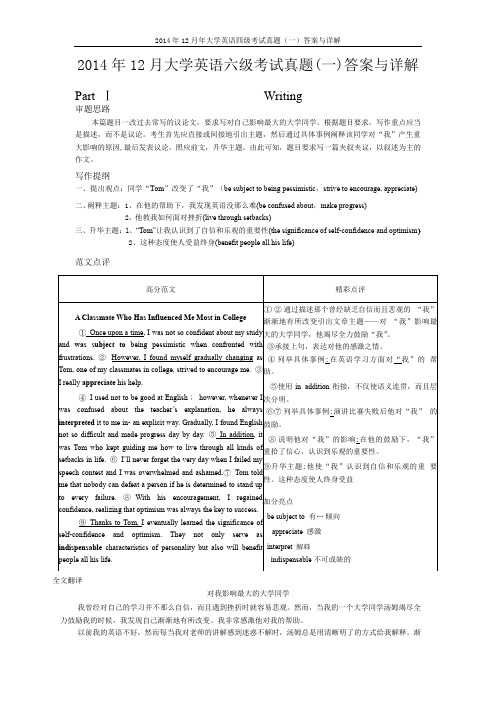
2014年12月大学英语六级考试真题(一)答案与详解Part Ⅰ Writing审题思路本篇题目一改过去常写的议论文,要求写对自己影响最大的大学同学。
根据题目要求,写作重点应当是描述,而不是议论。
考生首先应直接或间接地引出主题,然后通过具体事例阐释该同学对“我”产生重大影响的原因,最后发表议论,照应前文,升华主题。
由此可知,题目要求写一篇夹叙夹议,以叙述为主的作文。
写作提纲一、提出观点:同学“Tom ”改变了“我”(be subject to being pessimistic ,strive to encourage, appreciate)二、阐释主题:1、在他的帮助下,我发现英语没那么难(be confused about ,make progress)2、他教我如何面对挫折(live through setbacks) 三、升华主题:l 、“Tom”让我认识到了自信和乐观的重要性(the significance of self-confidence and optimism )2、这种态度使人受益终身(benefit people all his life)范文点评全文翻译对我影响最大的大学同学我曾经对自己的学习并不那么自信,而且遇到挫折时就容易悲观。
然而,当我的一个大学同学汤姆竭尽全力鼓励我的时候,我发现自己渐渐地有所改变。
我非常感激他对我的帮助。
以前我的英语不好,然而每当我对老师的讲解感到迷惑不解时,汤姆总是用清晰明了的方式给我解释。
渐高分范文 精彩点评A Classmate Who Has Influenced Me Most in College ① Once upon a time, I was not so confident about my study and was subject to being pessimistic when confronted with frustrations. ② However, I found myself gradually changing as Tom, one of my classmates in college, strived to encourage me. ③ I really appreciate his help. ④ I used not to be good at English ; however, whenever I was confused about the teacher’s explanation, he always interpreted it to me in- an explicit way. Gradually, I found English not so difficult and made progress day by day. ⑤ In addition, it was Tom who kept guiding me how to live through all kinds of setbacks in life. ⑥ I’l l never forget the very day when I failed my speech contest and I was overwhelmed and ashamed.⑦ Tom told me that nobody can defeat a person if he is determined to stand upto every failure. ⑧With his encouragement, I regained confidence, realizing that optimism was always the key to success. ⑨ Thanks to Tom, I eventually learned the significance ofself-confidence and optimism. They not only serve as indispensable characteristics of personality but also will benefit people all his life.① ②通过描述那个曾经缺乏自信而且悲观的 “我”渐渐地有所改变引出文章主题——对 “我”影响最大的大学同学,他竭尽全力鼓励“我”。
日语能力考(2014年12月N1真题阅读原文翻译)
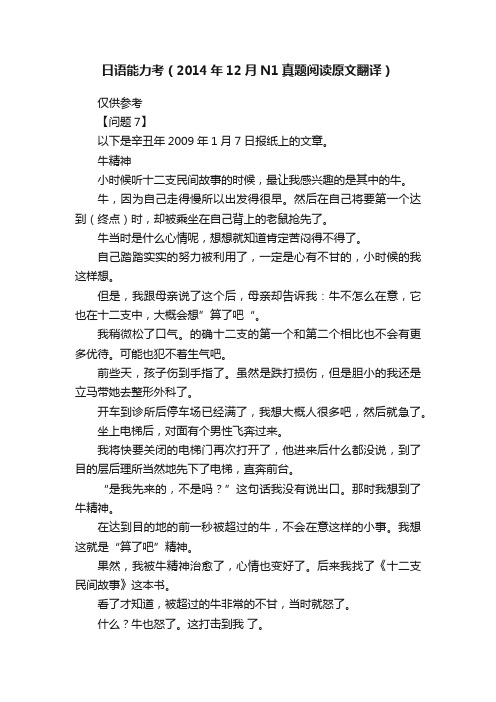
日语能力考(2014年12月N1真题阅读原文翻译)仅供参考【问题7】以下是辛丑年2009年1月7日报纸上的文章。
牛精神小时候听十二支民间故事的时候,最让我感兴趣的是其中的牛。
牛,因为自己走得慢所以出发得很早。
然后在自己将要第一个达到(终点)时,却被乘坐在自己背上的老鼠抢先了。
牛当时是什么心情呢,想想就知道肯定苦闷得不得了。
自己踏踏实实的努力被利用了,一定是心有不甘的,小时候的我这样想。
但是,我跟母亲说了这个后,母亲却告诉我:牛不怎么在意,它也在十二支中,大概会想”算了吧“。
我稍微松了口气。
的确十二支的第一个和第二个相比也不会有更多优待。
可能也犯不着生气吧。
前些天,孩子伤到手指了。
虽然是跌打损伤,但是胆小的我还是立马带她去整形外科了。
开车到诊所后停车场已经满了,我想大概人很多吧,然后就急了。
坐上电梯后,对面有个男性飞奔过来。
我将快要关闭的电梯门再次打开了,他进来后什么都没说,到了目的层后理所当然地先下了电梯,直奔前台。
“是我先来的,不是吗?”这句话我没有说出口。
那时我想到了牛精神。
在达到目的地的前一秒被超过的牛,不会在意这样的小事。
我想这就是“算了吧”精神。
果然,我被牛精神治愈了,心情也变好了。
后来我找了《十二支民间故事》这本书。
看了才知道,被超过的牛非常的不甘,当时就怒了。
什么?牛也怒了。
这打击到我了。
是的,该怒时就怒这点也很重要,我平静地思考。
今年我的目标就是好好地掌握如何分开使用“算了吧”和“是时候怒了”的平衡。
【问题8】(1)所有的失败都会在孩子以后的人生中为其避免大过错发挥重要作用。
这样一想,在孩子搞砸之前出手帮他是多么没有先见的教育啊。
但是,父母还是得一直在孩子身边好好地守护着。
虽说不伸手帮助他们,但是要准备好在危险的时候随时出手相救。
然后如果孩子摔倒受伤了,要教他们“怎么样?痛吧?注意不要再碰到了”。
父母要有这样的教育方式。
(2)以下是某公司网页上的通知。
満沼健康食品股份有限公司消息关于2014.10.14健康食品“维他命生活V”的通知各位顾客平时承蒙厚爱感激不尽。
《J.TEST实用日本语检定考试2014年真题集》(E-F级)译文
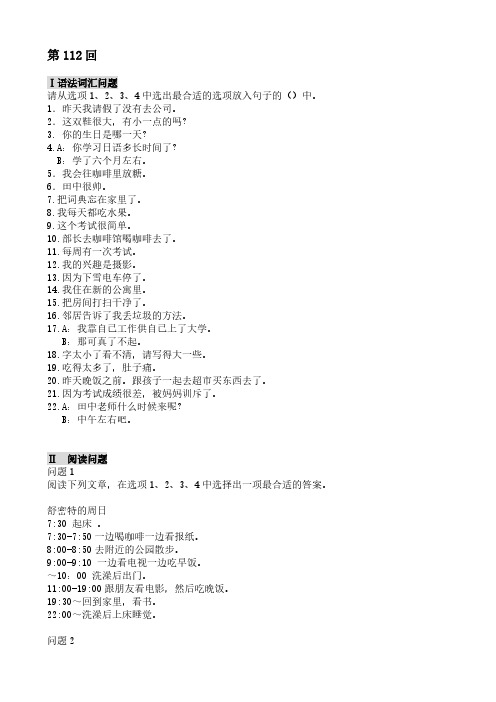
问了小学的男生和女生后知道,男孩子中很多人都想成为棒球运动员或者足球运动员。而希 望成为公司职员的回答,这回初次排到了第四位。 女孩子的回答里,希望把自己喜欢的事情当作职业的很多。比如说,很多人选择了“因为很 喜欢动物”。同样因为喜欢小孩子所以想做幼儿园老师,因为喜欢面包所以想开面包房等回 答也出现了。 到了初中和高中阶段,会选择更现实的工作。在初中男生中,公司职员成为了第 2 位,女生 中第一位的答案是幼儿园老师,护士是第二位。
问题 22 现在你最想要的东西是什么? 1 不,不想要。 2 新的电脑。 3 车是我想要的东西。
问题 23 请问我可以冒昧看一下吗? 1 请,请吃吧。 2 请,请看吧。 3 请,请讲吧。
问题 24 不好意思,我忘了把跟你借的那本书带来了。 1 明天也可以哦。 2 明天挺好的。 3 明天的话我没问题。
问题 4 阅读下列文章,在选项 1、2、3、4 中选择出一项最合适的答案。
向四个人询问了他们“想要的生日礼物”。 A:我的生日在一月份,日本的一月很寒冷,所以过生日的时候,我跟妈妈说了我想要一件 暖和的外套,不用太贵的。 B:比起礼物,好吃的更好。因为我不会做饭,所以在我生日的时候,我希望让我女朋友给 我做好吃的日本料理。 C:上周我在东京的商场里看到了一个很漂亮的钱包,我想要那个钱包。虽然很贵,但是我 老公说可以买。下周我打算跟老公一起去买。 D:明年我们全家要去日本旅行,所以我想要一个大的旅行包。另外,我没有相机,还想要一 台相机。
第 112 回
Ⅰ语法词汇问题 请从选项 1、2、3、4 中选出最合适的选项放入句子的()中。 1.昨天我请假了没有去公司。 2.这双鞋很大,有小一点的吗? 3. 你的生日是哪一天? 4.A:你学习日语多长时间了?
2014年最新版高考日语试题及答案
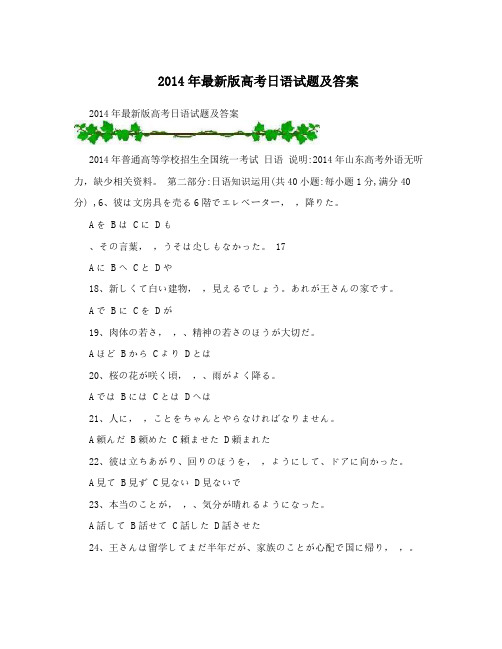
2014年最新版高考日语试题及答案2014年最新版高考日语试题及答案2014年普通高等学校招生全国统一考试日语说明:2014年山东高考外语无听力,缺少相关资料。
第二部分:日语知识运用(共40小题:每小题1分,满分40分) ,6、彼は文房具を売る6階でエレベーター,,降りた。
Aを Bは Cに Dも、その言葉,,うそは尐しもなかった。
17Aに Bへ Cと Dや18、新しくて白い建物,,見えるでしょう。
あれが王さんの家です。
Aで Bに Cを Dが19、肉体の若さ,,、精神の若さのほうが大切だ。
Aほど Bから Cより Dとは20、桜の花が咲く頃,,、雨がよく降る。
Aでは Bには Cとは Dへは21、人に,,ことをちゃんとやらなければなりません。
A頼んだ B頼めた C頼ませた D頼まれた22、彼は立ちあがり、回りのほうを,,ようにして、ドアに向かった。
A見て B見ず C見ない D見ないで23、本当のことが,,、気分が晴れるようになった。
A話して B話せて C話した D話させた24、王さんは留学してまだ半年だが、家族のことが心配で国に帰り,,。
Aたい Bよう Cらしい Dたがっている 25、お母さんは子供に肩を揉んでもらって、気持ち,,でした。
Aいいよう Bよさそう Cいいみたい Dよいらしい 26、中村さんは朝から頭が痛いと言っています。
風邪の,,です。
Aよう Bそう Cみたい Dらしい27、本棚の横に、望遠鏡が掛けて,,。
Aいた Bみた Cあった Dおいた28、歌手としての道は厳しいですが、これからも歌で食べて,,つもりです。
Aくる Bいく Cおく Dしまう29、これは簡単なことかどうか、まず自分でやって,,ことだ。
Aいる Bおる Cみる Dある30、ゆうべお茶を飲みすぎた,,か、よく寝られなかった。
Aもの Bせい Cこと Dおかげ31、昨日、雨に降られて、ひどい,,に遭ったよ。
A気 B耳 C目 D口32、激しく降っていた雨が,,止んで、美しく晴れ上がった。
大学日语四级考试真题
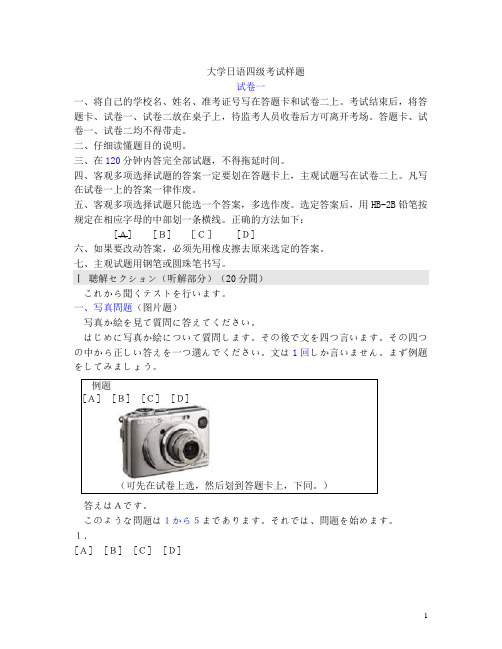
大学日语四级考试样题试卷一一、将自己的学校名、姓名、准考证号写在答题卡和试卷二上。
考试结束后,将答题卡、试卷一、试卷二放在桌子上,待监考人员收卷后方可离开考场。
答题卡、试卷一、试卷二均不得带走。
二、仔细读懂题目的说明。
三、在120分钟内答完全部试题,不得拖延时间。
四、客观多项选择试题的答案一定要划在答题卡上,主观试题写在试卷二上。
凡写在试卷一上的答案一律作废。
五、客观多项选择试题只能选一个答案,多选作废。
选定答案后,用HB-2B铅笔按规定在相应字母的中部划一条横线。
正确的方法如下:[A] [B] [C][D]六、如果要改动答案,必须先用橡皮擦去原来选定的答案。
七、主观试题用钢笔或圆珠笔书写。
Ⅰ聴解セクション(听解部分)(20分間)これから聞くテストを行います。
一、写真問題(图片题)写真か絵を見て質問に答えてください。
はじめに写真か絵について質問します。
その後で文を四つ言います。
その四つの中から正しい答えを一つ選んでください。
文は1回しか言いません。
まず例題をしてみましょう。
例題[A] [B] [C] [D](可先在试卷上选,然后划到答题卡上,下同。
)答えはAです。
このような問題は1から5まであります。
それでは、問題を始めます。
1.[A] [B] [C] [D]2.[A] [B] [C] [D]3.[A] [B] [C] [D]4.[A] [B] [C] [D]5.[A] [B] [C] [D]二、応答問題(应答题)始めに一人が短い文を一つ言う。
その後でもう一人がそれに答える。
正しい答えを[A][B][C][D]から、一つ選んでください。
文は一回しか言いない。
まず例題をしてみよう。
例題[A] [B] [C] [D]答えはAです。
このような問題は6から10まであります。
それでは、問題を始めます。
6.[A] [B] [C] [D]7.[A] [B] [C] [D]8.[A] [B] [C] [D]9.[A] [B] [C] [D]10.[A] [B] [C] [D]三、会話問題(对话题)二人の会話を聞いて、質問に答えてください。
2014-12 n2真题

2014.12 N2真题词汇問題11.この店は、今月に入って、客数が極端に減ったらしい。
•きょたん•きょてん•きょくたん•きょくてん2.食事が済んだら、食器はここに戻してください。
•かえして•のこして•わたして•もどして3.この効果はどのくらい継続するのだろう。
•じぞく•けいぞく•じそく•けいそく4.これらの経費は除いて計算してください。
•のぞいて•はぶいて•ぬいて•ひいて5.A国とB国の間で盛んに貿易が行われている。
•もうえき•ぼうえき•もうい•ぼうい問題26.くわしいことは、あとで担当の先生に聞いてください。
•許しい•詳しい•討しい•評しい7.兄は学費のえんじょを受けて大学に通いました。
•補助•援財•補財•援助8.物を入れすぎて袋がやぶれてしまった。
•被れて•割れて•破れて•削れて9.これは少しめんどうな仕事ですね。
•面到•免倒•面倒•免到10.家に帰る途中、手帳をひろった。
•拾った•採った•捨った•授った問題311.この器具は使い方を間違えると、けがをする危険( )がある。
•素•態•状•性11.この作業は( )経験の人でも簡単にできます。
•未•不•少•低13.このカードは期限( )なので、使うことができません。
•越え•折れ•切れ•終え14.これは( )性能のカメラで撮られた映像です。
•優•高•良•上15.森さんは毎日掃除をするらしいが、私は忙しいので一日( )にしている。
•あき•とり•おき•とび問題416.誰にも言えずにずっと悩んでいたが、昨日親友に( )相談してみた。
•思いきって•うっかり•せっかく•知らず知らず17.原稿に漢字の誤りがあったので、赤のペンで( )した。
•交換•改訂•変換•訂正18.選手たちは、次の大会での優勝を( )、毎日遅くまで練習している。
•とらえて•めざして•みはって•にぎって19.この小説はとてもおもしろかったので、最後まで( )読んでしまった。
•一気に•一時的に•一斉に•一方的に20.希望の職に就きたいのなら、情報を集めて、必要な知識を( )おくことが大切だ。
2014年大学日本语専攻生四级能力试験问题

大学日本語専攻生四級能力試験問題(2014)(試験時間:160分)注意:解答はすべて解答用紙に書きなさい。
第一部分一、聴解(1*20=20点)二、次の文の下線をつけた単語の正しい読み方や漢字を、後のA、B、C、D、から一つ選びなさい。
(1*10=10点)21、明日の一、二時間目はきゅうこうになったので、ゆっくり寝られる。
A.休航B.休行C.休講D.休校22、この会の会費は三か月に一回ちょうしゅうされる。
A.徴収B.徴集C.超収D.兆集23、長年勤めていた会社をやめることになった。
A.止B.辞C.病D.已24、これは胃腸の働きを高め消化をうながす薬です。
A.催B.施C.増D.促25、試験のさいてんは公正に行わなければならない。
A.采点B.採点C.再転D.祭典26、次の方は、呼ばれるまでこちらの部屋で控えていてください。
A.ひかB.そなC.そろD.おさ27、大国間の緊張が強まれば、平和が脅かされる。
A.おB.おどろC.おびやD.くじ28、差し支えがなければ、メールアドレスを教えていただけないでしょうか。
A.さしおさB.さしささC.さしちがD.さしつか29、何も敷かすに芝生に寝転んだ。
A.まB.ひC.しD.お30、彼は管理者として、事故の責任を免れることはできない。
A.ぬがB.のがC.まねかD.まぬか三、次の文の___に入れるのに最も適当な言葉を後のA、B、C、Dから一つ選びなさい。
(1*15=15点)31、このような施策によって環境の著しい汚染や破壊を防止することには相当程度の___をおさめた。
A.効果B.効力C.成功D.成績32、私の家は東南の角地で___がよく、敷地としては良いところです。
A.風当たりB.雨当たりC.人当たりD.日当たり33、これはイギリス人が大陸の人々へ抱いている___について書かれた本である。
A.イメージB.インフレC.エネルギーDエプロン34、旅行に対する考え方など、国民の余暇と旅行に関する意識を___により調査した。
2014专四部分真题参考答案
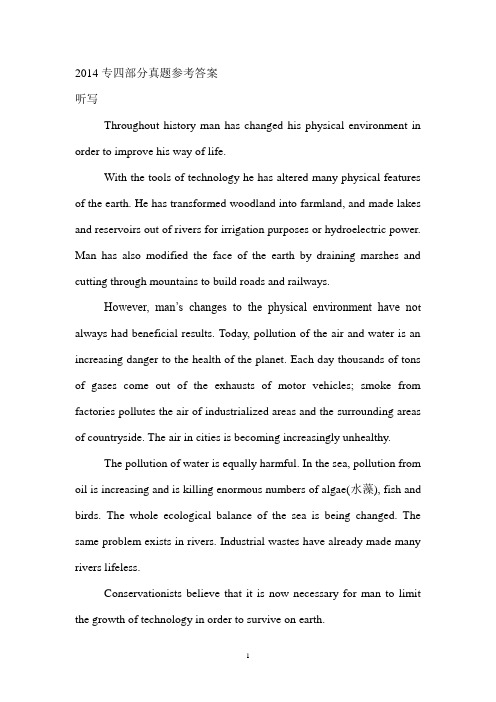
2014专四部分真题参考答案听写Throughout history man has changed his physical environment in order to improve his way of life.With the tools of technology he has altered many physical features of the earth. He has transformed woodland into farmland, and made lakes and reservoirs out of rivers for irrigation purposes or hydroelectric power. Man has also modified the face of the earth by draining marshes and cutting through mountains to build roads and railways.However, man’s changes to the physical environment have no t always had beneficial results. Today, pollution of the air and water is an increasing danger to the health of the planet. Each day thousands of tons of gases come out of the exhausts of motor vehicles; smoke from factories pollutes the air of industrialized areas and the surrounding areas of countryside. The air in cities is becoming increasingly unhealthy.The pollution of water is equally harmful. In the sea, pollution from oil is increasing and is killing enormous numbers of algae(水藻), fish and birds. The whole ecological balance of the sea is being changed. The same problem exists in rivers. Industrial wastes have already made many rivers lifeless.Conservationists believe that it is now necessary for man to limit the growth of technology in order to survive on earth.完形真题原文:The Victorians had become addicted to speed and, like all speed crazy kids, they wanted to go ever faster. Time was money and efficiency became increasingly important. Although division of labour had been conceived by Adam Smith and illustrated by a pin factory in The Wealth of Nations in 1776, it could now become fully realised. This specialisation and - by implication - individualisation of labour was in marked contrast to the rural means of production, in which the family was the means of production, consumption and socialisation.With greater speed came a greater need for industries and businesses to make more and make it quicker. Steam made this possible and changed working life forever. Gone were the days when work was dictated by natural forces: steam engines were servant to neither season nor sunshine. Factories had foremen and life became correspondingly more regimented. The clocking-on machine was invented in 1885 and time and motion studies to increase efficiency would be introduced only some twenty years later. But it was not all bad news. Agricultural incomes depended on variable harvests and weather. Factories provided secure and predictable income, but long hours.Working life was becoming increasingly regulated, and the working week was reorganised to promote ever-greater efficiency. The old custom of St. Monday - when no work was done - was gradually phased out and to compensate, work stopped around midday on Saturday and did not resume until Monday morning. A new division between 'work' and 'leisure' emerged, and this new block of weekend leisure time coincided with the development of spectator sports like cricket and football, and the rise of music hall entertainment for the new working classes.注:黑体字为每个空格的答案阅读理解Text A来自Of Human Bondage(人性的枷锁)第十一章Philip noticed that 'extras' gave boys a certain consideration and made up his mind, when he wrote to Aunt Louisa, to ask for them.After breakfast the boys wandered out into the play-ground. Here the day-boys were gradually assembling. They were sons of the local clergy, of the officers at the Depot, and of such manufacturers or men of business as the old town possessed. Presently a bell rang, and they all trooped into school. This consisted of a large, long room at opposite ends of which two under-masters conducted the second and third forms, and of a smaller one, leading out of it, used by Mr. Watson, who taught the first form. To attach the preparatory to the senior school these three classes were known officially, on speech days and in reports, as upper, middle, and lower second. Philip was put in the last. The master, a red-faced man with a pleasant voice, was called Rice; he had a jolly manner with boys, and the time passed quickly. Philip was surprised when it was a quarter to eleven and they were let out for ten minutes' rest.The whole school rushed noisily into the play-ground. The new boys were told to go into the middle, while the others stationed themselves along opposite walls. They began to play Pig in the Middle. The old boys ran from wall to wall while the new boys tried to catch them: when one was seized and the mystic words said--one, two, three, and a pig for me--he became a prisoner and, turning sides, helped to catch those who were still free. Philip saw a boy running past and tried to catch him, but his limp gave him no chance; and therunners, taking their opportunity, made straight for the ground he covered. Then one of them had the brilliant idea of imitating Philip's clumsy run. Other boys saw it and began to laugh; then they all copied the first; and they ran round Philip, limping grotesquely, screaming in their treble voices with shrill laughter. They lost their heads with the delight of their new amusement, and choked with helpless merriment. One of them tripped Philip up and he fell, heavily as he always fell, and cut his knee. They laughed all the louder when he got up. A boy pushed him from behind, and hewould have fallen again if another had not caught him. The gamewas forgotten in the entertainment of Philip's deformity. One ofthem invented an odd, rolling limp that struck the rest as supremely ridiculous, and several of the boys lay down on the ground androlled about in laughter: Philip was completely scared. He could not make out why they were laughing at him. His heart beat so that he could hardly breathe, and he was more frightened than he had ever been in his life. He stood still stupidly while the boys ran round him, mimicking and laughing; they shouted to him to try and catch them; but he did not move. He did not want them to see him run any more. He was using all his strength to prevent himself from crying.Text BFor parents who send their kids off to college saying, “These will be thebest years of your life,” it would be very appropriate to add, “If you can handle the stress of college life.”Freshmen are showing up already stressed out, according to the latest CIRP Freshman Survey that reported students' emotional health levels at their lowest since the survey started in 1985. While in school, more students are working part-time and near-full-time jobs. At graduation, only 29 percent of seniors have jobs lined up.Pressure to excel often creates stress, and many students are not learning how to effectively handle this stress.1) Stress can make smart people do stupid things: Stress causes what brain researchers call “cortical inhibition.”In simple terms, stress inhibits a part of the brain responsible for decision-making and reaction time and can adversely affect other mental abilities as well.2) The human body doesn't discriminate between a big stressful event and a little one: Any stressful experience will create a cascade of 1,400 biochemical events in your body. If any amount of stress is left unchecked, many things can occur within the body, including premature aging, impaired cognitive function and energy drain.3) Stress can become your new norm: When you regularly experience negative feelings and high amounts of stress, your brain recognizes this as your normal state. This then becomes the new norm, or baseline for your emotional state.4) Stress can be controlled: Countless studies demonstrate that people can restructure their emotional state using emotion-refocusing techniques. These techniques help you recognize how you are feeling and shift to a more positive emotional, mental and physical state.5) Stress less by loving what you study: Barbara Frederickson, a leading international authority on the importance of positive emotions, says humans are genetically programmed to seek positive emotions such as love and joy. It's suggested to choose a major or career path you love and enjoy. Otherwise, you could end up fighting against your own biology.选自:华盛顿邮报Text CFor anyone who doubts that the texting revolution is upon us, consider this: The average 13- to 17-year-old sends and receives 3,339 texts a month—more than 100 per day, according to the Nielsen Co., the media research firm. Adults are catching up. People from ages 45 to 54 sent and received 323 texts a month in the second quarter of 2010, up 75% from a year ago, Nielsen says.Behind the texting explosion is a fundamental shift in how we view our mobile devices. That they are phones is increasingly beside the point.Part of what's driving the texting surge among adults is the popularity of social media. Sites like Twitter, with postings of no morethan 140 characters, are creating and reinforcing the habit of communicating in micro-bursts. And these sites also are pumping up sheer volume. Many Twitter and Facebook devotees create settings that alert them, via text message, every time a tweet or message is earmarked for them. In October 2009, 400 million texts alerted social-media users to such new messages across AT&T's wireless network, says Mark Collins, AT&T senior vice president for data and voice products; by September 2010, the number had more than doubled to one billion. (Twitter reports more than two billion tweets are sent each month.)Text D (/reading/exercise/ess2/hadfield.htm)Relation to life. The healthy adolescent boy or girl likes to do the real things in life, to do the things that matter. He would rather be a plumber's mate and do a real job that requires doing than learn about hydrostatics sitting at a desk, without understanding what practical use they are going to be. A girl would rather look after the baby than learn about child care.Logically we should learn about things before doing them and that is presumably why the pundits enforce this in our educational system. But it is not the natural way-nor, I venture to think, the best way. The adolescent wants to do things first for only then does he appreciate the problems involved and want to learn more about them.They do these things better in primitive life, for there at puberty the boy joins his father in making canoes, patching huts, going out fishing or hunting, and preparing weapons of war. He is serving his apprenticeship in the actual accomplishments of life. It is not surprising that anthropologists find that the adolescents of primitive communities do not suffer from the same neurotic 'difficulties' as those of civilized life. This is not, as some assume, because they are permitted more sexual freedom, but because they are given more natural outlets for their native interests and powers and are allowed to grow up freely into a full life of responsibility in the community.In the last century this was recognized in the apprenticeship system, which allowed the boy to go out with the master carpenter, thatcher, or ploughman, to engage in the actual work of carpentry, roof-mending, or ploughing, and so to learn his trade. It was the same in medicine, in which a budding young doctor of sixteen learnt his job by going round with the general practitioner and helping with the blood-letting and physic. In our agricultural colleges at the present time young men have to do a year's work on a farm before their theoretical training at college. The great advantage of this system is that it lets the apprentice see the practical problems before he sets to work learning how to solve them, and he can therefore take a more intelligent interest in his theoretical work. That is also why a girl should be allowed to give expression to her naturaldesire to look after children, and then, when she comes up against difficulties, to learn the principles of child care.Since more knowledge of more things is now required in order to cope with the adult world, the period of growing-up to independence takes much longer than it did in a more primitive community, and the responsibility for such education, which formerly was in the hands of the parents, is now necessarily undertaken by experts at school. But that should not make us lose sight of the basic principle, namely the need and the desire of the adolescent to engage responsibly in the 'real' pursuits of life and then to learn how-to learn through responsibility, not to learn before responsibility.。
大学日本语四级试験 大学日语四级真题
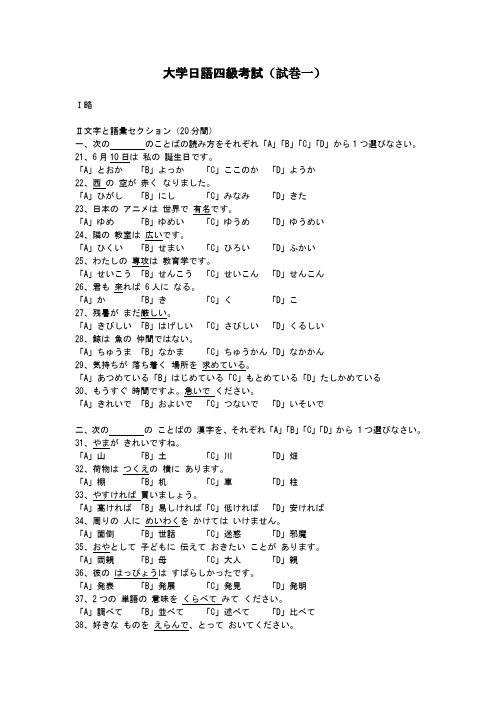
大学日語四級考試(試巻一)Ⅰ略Ⅱ文字と語彙セクション(20分間)一、次ののことばの読み方をそれぞれ「A」「B」「C」「D」から1つ選びなさい。
21、6月10日は私の誕生日です。
「A」とおか「B」よっか「C」ここのか「D」ようか22、西の空が赤くなりました。
「A」ひがし「B」にし「C」みなみ「D」きた23、日本のアニメは世界で有名です。
「A」ゆめ「B」ゆめい「C」ゆうめ「D」ゆうめい24、隣の教室は広いです。
「A」ひくい「B」せまい「C」ひろい「D」ふかい25、わたしの専攻は教育学です。
「A」せいこう「B」せんこう「C」せいこん「D」せんこん26、君も来れば 6人になる。
「A」か「B」き「C」く「D」こ27、残暑がまだ厳しい。
「A」きびしい「B」はげしい「C」さびしい「D」くるしい28、鯨は魚の仲間ではない。
「A」ちゅうま「B」なかま「C」ちゅうかん「D」なかかん29、気持ちが落ち着く場所を求めている。
「A」あつめている「B」はじめている「C」もとめている「D」たしかめている30、もうすぐ時間ですよ。
急いでください。
「A」きれいで「B」およいで「C」つないで「D」いそいで二、次ののことばの漢字を、それぞれ「A」「B」「C」「D」から 1つ選びなさい。
31、やまがきれいですね。
「A」山「B」土「C」川「D」畑32、荷物はつくえの横にあります。
「A」棚「B」机「C」車「D」柱33、やすければ買いましょう。
「A」高ければ「B」易しければ「C」低ければ「D」安ければ34、周りの人にめいわくをかけてはいけません。
「A」面倒「B」世話「C」迷惑「D」邪魔35、おやとして子どもに伝えておきたいことがあります。
「A」両親「B」母「C」大人「D」親36、彼のはっぴょうはすばらしかったです。
「A」発表「B」発展「C」発見「D」発明37、2つの単語の意味をくらべてみてください。
「A」調べて「B」並べて「C」述べて「D」比べて38、好きなものをえらんで、とっておいてください。
历年四级真题(选词填空)2014年12月-2016年12月

历年四级真题(选词填空)2014年12月-2016年12月2016年12月第一套题Many men and women have long bought into the idea that there are “male” and “female”brains, believing that explains just about every difference between the sexes. A new study 26 that belief, questioning whether brains really can be distinguished by gender.In the study, Tel Aviv University researchers 27 for sex differences throughout the entire human brain.And what did they find? Not much. Rather than offer evidence for 28 brains as “male” or“female”, research shows that brains fall into a wide range , with most people falling right in the middle.Daphna Joel ,who led the study, said her research found that while there are some gender ‐based 29 ,many different types of brain can’t always be distinguished by gender.While the “average”male and“average”female brains were 30different, you couldn’t tell it by looking at individual brain scans. Only asmall 31of people had “all-male” or “all-female”characteristics.Larry Cahill, an American neuroscientist(神经科学家),said the study is an important addition to a growing body of research questioning 32 beliefs about gender and brain function. But he cautioned against concluding from this study that all brains are the same, 33 of gender.“There’s a mountain of evidence 34 the importance of sex influences at all levels of brain function ,”he told The Seattle Times.If anything, he said, the study 35that gender plays a very important role in the brain—“even when we are not clear exactly how.”注意:此部分试题请在答题卡2上作答。
